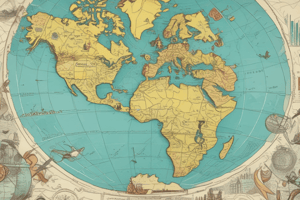Podcast
Questions and Answers
What is the primary focus of resource exploration?
What is the primary focus of resource exploration?
- Distributing resources to meet competing demands
- Discovering and identifying resources (correct)
- Conservation of resources
- Processing raw resources
What is the main goal of sustainable development?
What is the main goal of sustainable development?
- Meeting present needs without compromising future needs (correct)
- Meeting only present needs
- Fulfilling only environmental needs
- Protecting only natural resources
What is resource utilization?
What is resource utilization?
- Using resources efficiently and effectively (correct)
- Distributing resources to meet competing demands
- Transforming raw resources into usable forms
- Preserving resources for future use
What is the primary challenge addressed by resource substitution?
What is the primary challenge addressed by resource substitution?
What is the name of the global goals aimed at ending poverty, protecting the planet, and ensuring peace and prosperity?
What is the name of the global goals aimed at ending poverty, protecting the planet, and ensuring peace and prosperity?
What is the primary focus of resource conservation?
What is the primary focus of resource conservation?
What is the term for the three aspects of sustainability?
What is the term for the three aspects of sustainability?
What is the primary challenge addressed by environmental degradation?
What is the primary challenge addressed by environmental degradation?
What is the primary focus of human resources?
What is the primary focus of human resources?
Study Notes
Types of Resources
- Natural Resources: renewable (e.g., water, wind) and non-renewable (e.g., fossil fuels, minerals)
- Human Resources: labor, skills, and expertise
- Capital Resources: financial resources, infrastructure, and technology
- Information Resources: data, knowledge, and intellectual property
Resource Development
- Exploration: discovering and identifying resources
- Extraction: obtaining resources from the environment
- Processing: transforming raw resources into usable forms
- Conservation: preserving and managing resources for future use
Sustainable Development
- Meeting present needs: without compromising the ability of future generations to meet their own needs
- Three pillars: economic, social, and environmental sustainability
- United Nations' Sustainable Development Goals (SDGs): 17 goals aimed at ending poverty, protecting the planet, and ensuring peace and prosperity
Resource Management
- Resource allocation: distributing resources to meet competing demands
- Resource utilization: using resources efficiently and effectively
- Resource conservation: reducing waste and preserving resources
- Resource substitution: replacing scarce resources with alternatives
Development Challenges
- Resource scarcity: limited availability of resources
- Environmental degradation: pollution, climate change, and ecosystem destruction
- Social inequality: unequal access to resources and opportunities
- Economic instability: fluctuations in resource markets and prices
Types of Resources
- Natural resources can be renewable (e.g., water, wind) or non-renewable (e.g., fossil fuels, minerals)
- Human resources consist of labor, skills, and expertise
- Capital resources include financial resources, infrastructure, and technology
- Information resources encompass data, knowledge, and intellectual property
Resource Development
- Exploration involves discovering and identifying resources
- Extraction obtains resources from the environment
- Processing transforms raw resources into usable forms
- Conservation preserves and manages resources for future use
Sustainable Development
- Sustainable development meets present needs without compromising the ability of future generations to meet their own needs
- The three pillars of sustainability are economic, social, and environmental
- The United Nations' Sustainable Development Goals (SDGs) consist of 17 goals aimed at ending poverty, protecting the planet, and ensuring peace and prosperity
Resource Management
- Resource allocation distributes resources to meet competing demands
- Resource utilization involves using resources efficiently and effectively
- Resource conservation reduces waste and preserves resources
- Resource substitution replaces scarce resources with alternatives
Development Challenges
- Resource scarcity refers to the limited availability of resources
- Environmental degradation encompasses pollution, climate change, and ecosystem destruction
- Social inequality involves unequal access to resources and opportunities
- Economic instability refers to fluctuations in resource markets and prices
Studying That Suits You
Use AI to generate personalized quizzes and flashcards to suit your learning preferences.
Description
This quiz covers the different types of resources, including natural, human, capital, and information resources, as well as the stages of resource development, including exploration, extraction, and processing.





